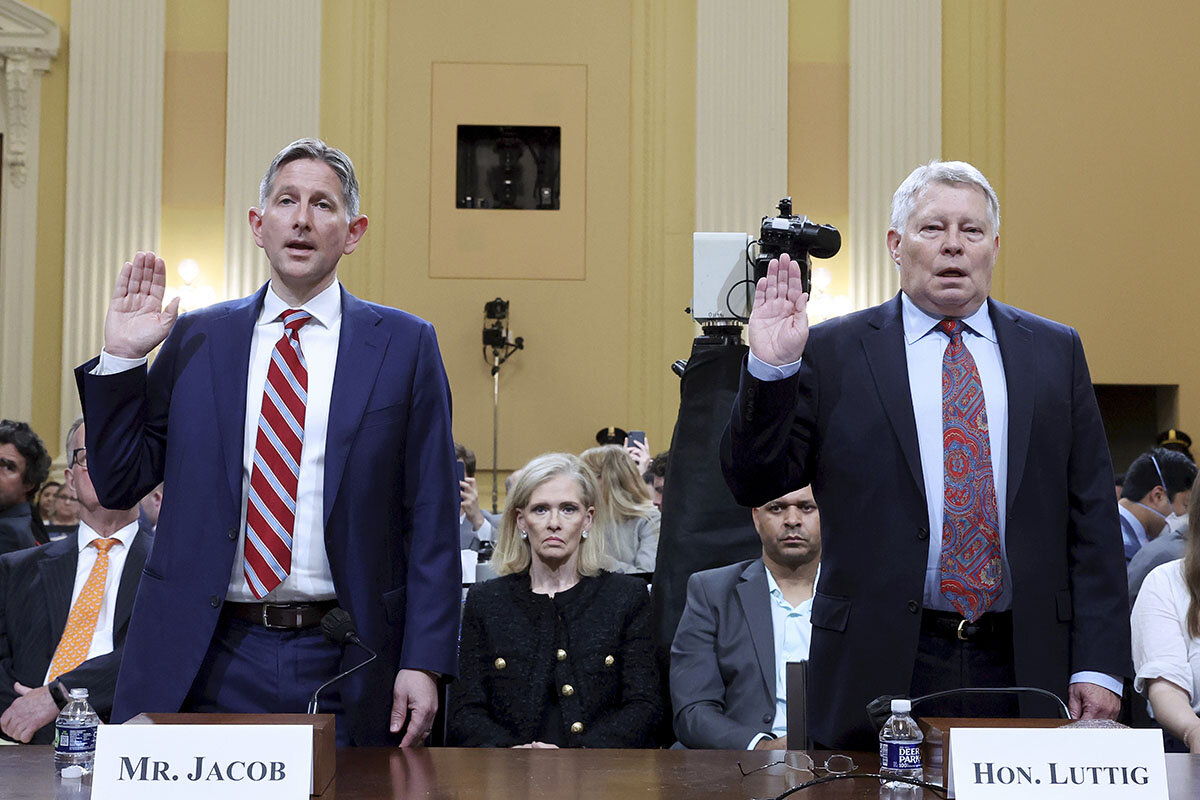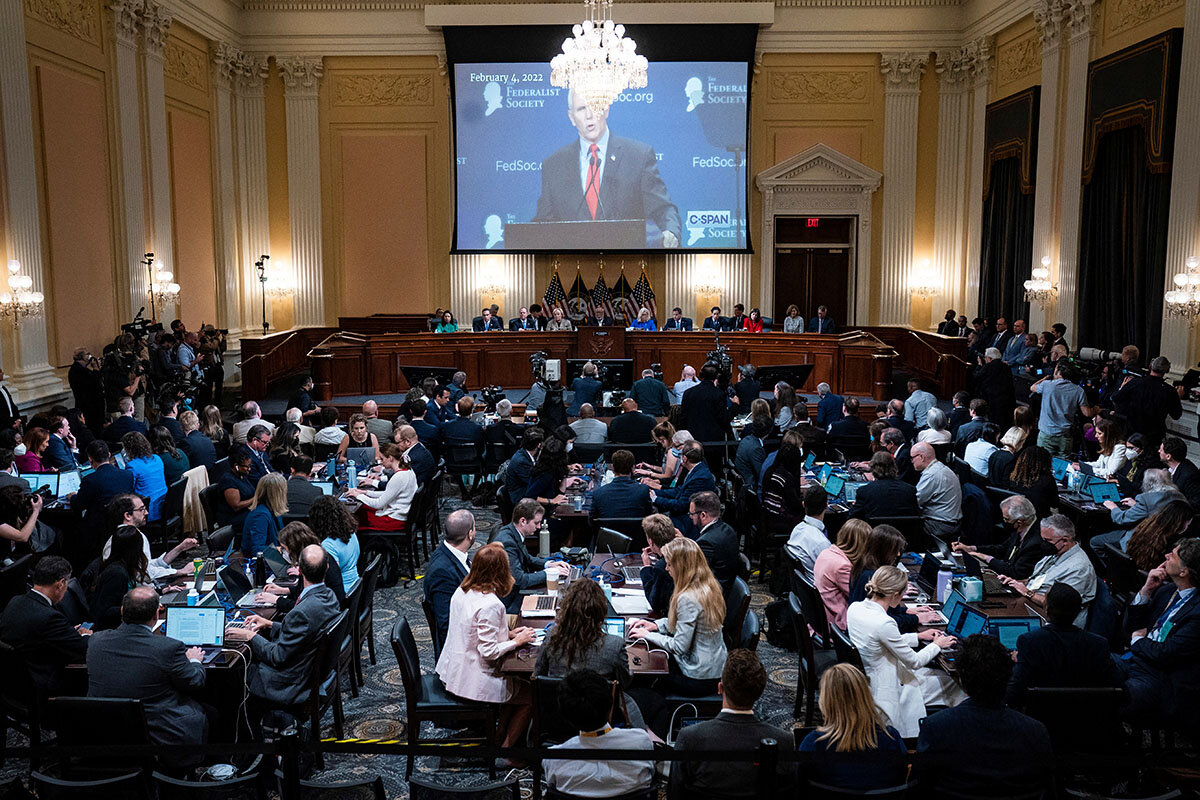Did Pence save America? Jan. 6 panel spotlights VP’s role.
Loading...
| Washington
“If men were angels, no government would be necessary,” the framers once wrote. On Thursday, the Jan. 6 committee credited Mike Pence with demonstrating a strength of character far above what the authors of the Constitution were counting on when they designed a system of government they hoped would withstand the excesses of human ambition and a lust for power.
In its third hearing this month, the committee laid out how then-Vice President Pence resisted a weeks-long pressure campaign by Donald Trump to overturn or at least delay the certification of Joe Biden as president. The committee contrasted Mr. Pence’s fidelity to the Constitution with what they portrayed as Mr. Trump’s flagrant disregard for it.
They depicted Mr. Trump as using the Constitution at best as a fig leaf for his own wounded pride, personal ambition, and desire for revenge. Though some conservative scholars took issue with states’ rapid and sweeping changes to election laws that led to unprecedented mail-in voting in 2020, the then-president based his call to “Stop the Steal” on unfounded claims of outright fraud. When that failed in the nation’s courts, he brought on a lawyer who advanced a dubious claim that the Constitution authorized the vice president to disrupt Congress’s counting of the electoral votes – but resorted to insults rather than legal reasoning when Mr. Pence refused.
Why We Wrote This
The Jan. 6 committee portrayed the republic as riding on the fidelity of individuals to the Constitution, whose checks and balances are being severely tested in an age of disinformation and rising political violence.
“The president latched on to a dangerous theory and would not let go because he was convinced it would keep him in office,” said committee member Pete Aguilar, a California Democrat who led Thursday’s hearing. “We witnessed firsthand what happened when the president of the United States weaponized this theory.”
As in the first two hearings, the committee on Thursday relied on Trump administration officials and other Republican witnesses to make its case, using video clips of committee depositions with Mr. Pence’s chief of staff, Trump legal advisers, and Jared Kushner and Ivanka Trump.
Retired conservative Judge J. Michael Luttig, who testified in person, called the Trump team’s legal arguments “beguiling and frivolous,” saying they had “no basis in the Constitution or the laws of the U.S.”
None of the testimony or featured clips provided a defense of Mr. Trump or of the legal reasoning underpinning his strategy, spearheaded by scholar John Eastman, who pleaded the Fifth Amendment in his deposition with the committee.
The nine-member committee has been criticized on the right for excluding dissenting views. It includes just two Republicans, after House Speaker Nancy Pelosi refused to seat two GOP members who had voted against certifying some states’ electors, leading Republican Leader Kevin McCarthy to pull all five of his appointees. Mr. McCarthy, along with several other Republican lawmakers, has refused to cooperate with the committee despite being served with a subpoena.
Mr. Luttig warned that while Mr. Pence had prevented the country from plunging into “revolution” in January 2021, the former president and his allies “are executing that blueprint for 2024 in open and plain view of the American public.”
In 2019, Ohio State law professor Edward Foley warned of a potential constitutional crisis if Mr. Trump, in the wake of a close election, sought to manipulate the Jan. 6 congressional proceedings to try to get himself declared the rightful winner. That idea gained currency in Mr. Trump’s circles at least two months before the November 2020 elections, and by early December Mr. Trump began actively lobbying Vice President Pence.
Under the 12th Amendment, Mr. Pence was to preside over a joint session of Congress to count the electoral votes from each state. As dozens of Mr. Trump’s suits alleging election fraud and irregularities failed to gain traction in the nation’s courts, the president argued that Mr. Pence could and should disrupt the counting.
From the beginning, Mr. Pence’s instinct was that the Constitution did not grant him the authority to do what Mr. Trump and Mr. Eastman had laid out.
“The truth is, there’s almost no idea more un-American than the notion that any one person could choose the American president,” said Mr. Pence in a speech last summer, admitting that while it was disappointing to lose the election, more was at stake. “If we lose faith in the Constitution, we won’t just lose elections. We’ll lose our country.”
Much of the testimony in Thursday’s hearing centered around the Electoral Count Act of 1887, which Congress passed after it had to intervene in a disputed presidential election eight years earlier. The law was meant to avoid such chaos from happening again, but Mr. Luttig and others say the wording is ambiguous and could be exploited by someone less scrupulous than Mr. Pence.
Greg Jacob, the vice president’s chief counsel, who also testified in person on Thursday, described to the Jan. 6 committee how he and his team had reviewed every electoral vote count in America’s history, the 1876 disputed election, the legislative history of the Electoral Count Act, and every law review article written about its constitutionality. They also fended off two lawsuits filed against the vice president to compel him to “exercise imagined extraconstitutional authority” and essentially decide the election himself.
Two days before the joint session, Mr. Trump and Mr. Eastman met with Mr. Pence and his top aides and laid out a pair of scenarios to provide Mr. Trump a path to victory: Reject the electors of key swing states outright, or send them back to the state legislatures, buying Mr. Trump time to pressure legislators to put forward new slates of electors who would certify him as the rightful winner.
Mr. Eastman recommended the latter course of action. However, Mr. Jacob testified that Mr. Eastman, when pressed, admitted that if that scheme was brought before the Supreme Court, it likely would be thrown out 9-0.
White House lawyers also disagreed with Mr. Eastman’s legal analysis, according to multiple Trump and Pence insiders. Mr. Kushner told the committee that he took White House Counsel Pat Cipollone’s threats to resign as “whining.”
That night, Mr. Pence’s outside counsel called Mr. Luttig for help. The retired judge, a conservative heavyweight in legal circles whom George W. Bush had reportedly considered nominating for the Supreme Court, had recently opened a Twitter account. With the help of his son, he published a thread of tweets that provided Mr. Pence the legal framework to dissent from the Trump-Eastman line of reasoning.
On the morning of Jan. 6, Mr. Trump called Mr. Pence and made one final push to change his mind. In a video clip played by the committee, Ivanka Trump testified that the conversation became “heated,” adding that it was “a different tone” than she’d heard her father take with Mr. Pence before.
Several hours later, in his “Save America” rally speech, Mr. Trump called on Mr. Pence to “do the right thing.” “All Vice President Pence has to do is send it back to the states to re-certify, and we become president, and you are the happiest people in the world,” he said, urging his supporters to march on the Capitol to encourage lawmakers to support only the “lawfully slated” electors. “Now it is up to Congress to confront this egregious assault on our democracy.”
At the Capitol, rioters chanted “Hang Mike Pence,” and breached the Senate side of the building as the vice president was overseeing a challenge to Arizona’s electors. Secret Service whisked him out of the chamber to his nearby office, then hurried him down a stairway just around the corner from rioters. They took him to a loading dock and urged him to evacuate. Nearly all of his entourage got in vehicles to depart the complex.
“But he looked at that and said: ‘I don’t want the world seeing the vice president leaving the Capitol in a 15-car motorcade,’ ” his then-chief of staff Marc Short told CNN this week. “ ‘This is the hallmark of democracy. And we’re going to complete our work.’ ”
Around 8 p.m., Mr. Pence gaveled Congress back into session. Just before midnight, Mr. Eastman made one last plea to go through with their plan. Mr. Pence resisted to the last, and shortly before 4 a.m. Congress declared Joe Biden and Kamala Harris the winners of the 2020 election.
But the danger has not passed, cautioned Judge Luttig, who has urged Congress to reform the Electoral Count Act so that America’s democracy will rest squarely on the rule of law and never again be contingent on one elected official’s integrity.
“No American ought to turn away from January 6, 2021,” he said, “until all of America comes to grips with what befell our country that day, and we decide what we want for our democracy from this day forward.”








